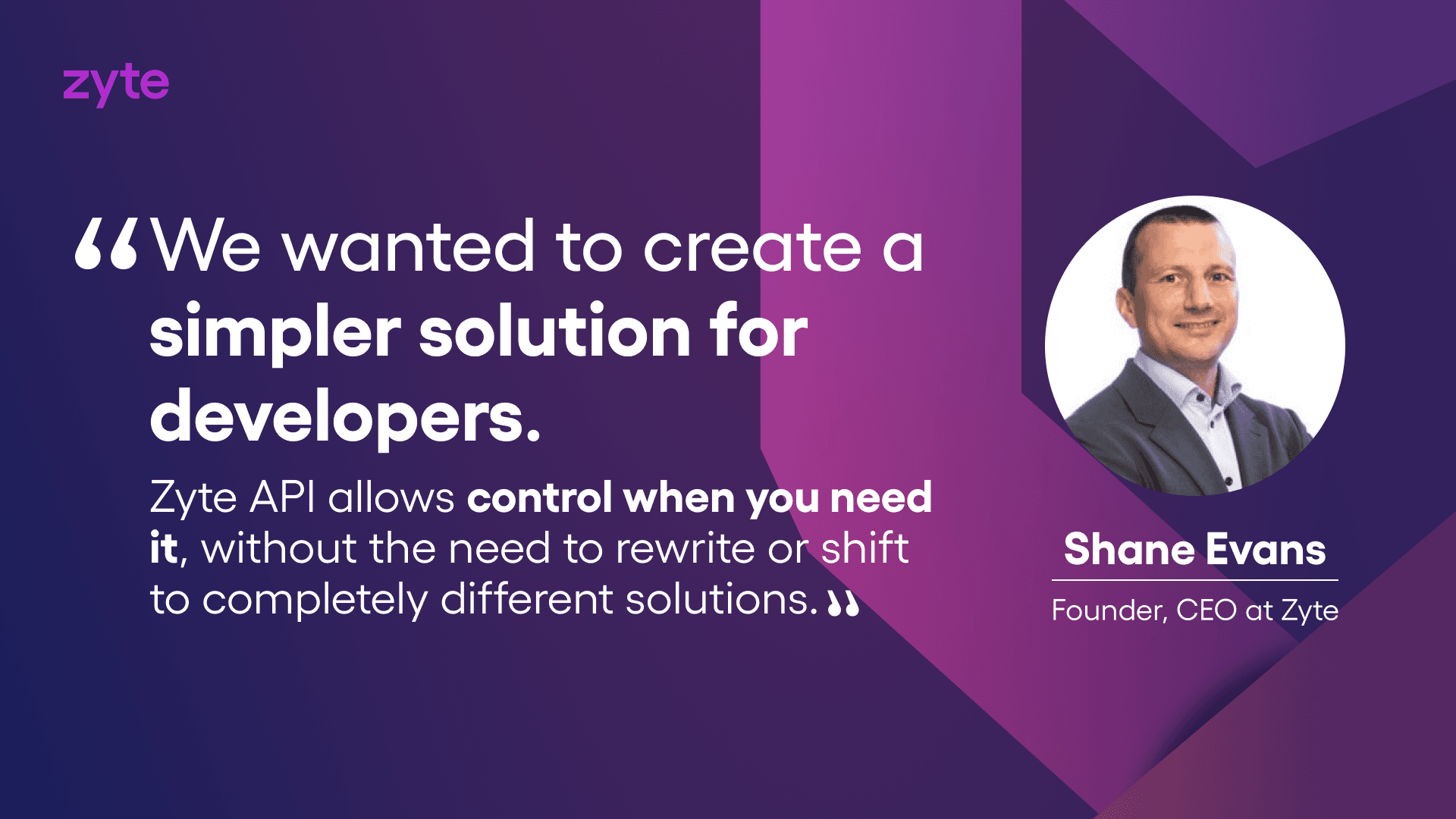The foundation of Web Scraping APIs: ‘As little per-website work as possible’ for developers
Zyte API was born out of necessity. “We realized we were burning too much time… a disproportionate amount of time was being spent on solving bans and moving between solutions.”, Shane Evans, CEO of Zyte, explained in a recent webcast.
In the modern digital economy, data has become the fuel driving global businesses, from e-commerce to real estate, news media, and beyond. Access to accurate, real-time data from the public web has become a critical element in maintaining a competitive edge. However, many organizations struggle with outdated web scraping methods, such as relying on proxy APIs. These tools, while helpful in bypassing geo-blocks and anti-bot measures, often involve complex, inefficient workflows. Managing large-scale proxies, resolving bans, and piecing together various tools for different stages of data extraction is a time-consuming, resource-intensive process.
Enter Zyte API—a solution that consolidates every aspect of the data extraction process into a single, efficient tool.
This article will dive into how Zyte API’s integrated approach makes developers and data teams more efficient compared to traditional proxy APIs.
The Quest for Efficiency: Built on Scrapy
Zyte’s journey toward efficiency began with Scrapy, the open-source web scraping framework developed by Evans and his team. Evans recounted the early challenges that led to the creation of Scrapy: "We tried a few existing solutions. Nothing really worked for us… we hired a few freelancers and we had a couple of Python scripts, and it didn’t really work very well. It wasn’t scalable. The data quality was poor."
This early experience highlighted a key issue that would become the foundation for future tools like Zyte API: the need to optimize developer productivity. As Evans described, “Let [developers] have to do as little per-website work as possible.”
This emphasis on developer productivity has carried through the evolution of Zyte’s solutions, culminating in the all-in-one simplicity of Zyte API.
What Is a Web Scraping API?
A web scraping API, such as Zyte API, is an end-to-end solution that automates the collection of data from websites. Unlike proxy APIs, which focus primarily on managing IP address routing to bypass detection, a web scraping API offers a more comprehensive set of tools. This includes everything from JavaScript rendering and session management to dynamic data extraction. It allows developers to perform complex interactions with web pages while ensuring that data is delivered in a structured, usable format.
As Evans explained in the recent fireside chat, this conception of all-encompassing web scraping APIs was inevitable as websites became increasingly complex: “The web itself changes... back in those early days, it was far simpler… nowadays, you get more things that require rendering, more complex, JavaScript-based UIs.”
Proxy APIs vs. Zyte API: The Key Differences
Proxy APIs primarily focus on IP rotation and rerouting to avoid detection and manage geo-restrictions. However, this is only a partial solution to the broader challenges of web scraping. Developers must still manage sessions, navigate through dynamic content, and handle anti-bot measures manually.

Evans highlighted the advantage of Zyte API’s comprehensive approach: “We built a single super proxy API… but it gradually started getting more complex, and that’s where we tried to simplify it now and bring in Zyte API.” By incorporating these various elements into one API, Zyte reduces the friction that developers encounter when moving between solutions.
Zyte API goes beyond simple IP management, combining it with a host of advanced features. Browser automation, session management, and even AI-powered data extraction are integrated into a single API. This eliminates the need for developers to juggle multiple tools, providing a streamlined, efficient workflow.
Zyte API: Four Features for Efficiency
1. Headless Browser Fleet
One of the standout features of Zyte API is its built-in headless browser fleet, which automates the process of rendering web pages. This is crucial for scraping websites with JavaScript-heavy content or advanced anti-bot measures. Traditionally, developers would need to manage browser instances themselves—a time-consuming and resource-heavy task.
As Evans put it, “You can access browser functionality… without needing to set up a lot of extra infrastructure.” This access to multiple browser stacks ensures that developers can scrape even the most complex websites efficiently, without managing the technical details of rendering pages themselves.
2. AI-Powered Data Extraction
Zyte’s journey with artificial intelligence began as early as 2017, when the company strategically explored machine learning for web scraping. Initially, the goal was to find a more efficient way to extract data from websites without needing to write custom code for each one. Zyte’s CEO, Shane Evans explained during the Fireside Chat: “It was always the holy grail to use AI to crawl data from previously unseen websites without writing code.”
The early versions of AI-powered extraction were promising but came with high costs and limitations. “The original quality wasn’t bad, best in class, but the costs were still high,” Evans shared. However, over time, Zyte’s team refined their machine learning models, significantly improving both their solutions' accuracy and cost-efficiency. The technology became more scalable by optimizing how AI interacted with the web and reducing reliance on browser rendering.
In 2024, AI had become Zyte’s primary method for extracting data, integrated seamlessly into their web scraping API. “Once we cracked a few big pieces, it became a compelling solution,” Evans noted. The shift to AI-powered scraping made data extraction faster and more accurate, allowing Zyte to scale its services across thousands of websites with minimal manual intervention.
Konstantin Lopukhin, Head of Data Science at Zyte, emphasized: “AI has allowed us to automate the extraction process more effectively. It became our main way of building new web scraping solutions.” This integration of AI into Zyte’s core technology continues to set the standard for web scraping, enabling developers to extract complex data at scale with unprecedented ease.
3. Session Management and IP Rotation
While proxy APIs offer IP rotation, they leave much of the burden of managing sessions and handling blocks to developers. Zyte API automates these tasks, providing seamless session persistence and advanced anti-bot solutions.
Zyte API eliminates this problem by integrating sophisticated IP rotation and ban-handling mechanisms into its workflow. As a result, developers can focus on extracting data rather than troubleshooting IP blocks or session timeouts.
4. Control Without the Complexity
Zyte API is designed to offer flexibility without the need for complex custom setups. Developers can customize scraping rules, tweak interactions with web elements, and manage data extraction workflows—all within the same API. As Evans described, “You can still let people have the same control if they need to make changes… but they don’t generally need to rewrite much code.”
This level of customization allows developers to adapt quickly to changes in website structure without having to rebuild entire scraping projects from scratch.
Real-World Impact: Time Savings and Scalability
The efficiency gains provided by Zyte API translate into tangible business benefits. By automating many of the most time-consuming aspects of web scraping, Zyte API enables data teams to scale their operations more quickly and cost-effectively. Evans shared that the decision to sunset Zyte’s most successful proxy product, Smart Proxy Manager, in favor of Zyte API came from a need to simplify.
For businesses scraping data from thousands of web pages across multiple websites, these time savings are significant. Tasks that used to take days or weeks with proxy APIs can now be completed in a matter of hours.
Conclusion
Zyte API represents a new frontier in web scraping, offering a fully integrated, automated solution that drastically reduces the complexity and inefficiency of traditional proxy APIs. By combining IP management, browser automation, and AI-powered data extraction into one cohesive tool, Zyte API allows developers and data teams to focus on what really matters: analyzing data and driving business insights.
As Evans put it, “Can we make this more hassle-free? Can we create a simpler solution for developers? Can we make our own team more productive?”
The answer, through Zyte API, is a resounding yes.
Try Zyte API now with a coupon code
Every web scraping developer who does not play with AI is missing opportunities to get data faster. Try Zyte AI Scraping now with the coupon code AISCRAPING2.
If you start trying Zyte AI Scraping and are still waiting to get data from a website in minutes, please contact our support.
FAQ
What is a web scraping API?
A web scraping API automates the extraction of data from websites by handling tasks like JavaScript rendering, session management, and dynamic data extraction. Zyte API integrates all these functions into one tool, making it more efficient than traditional methods like proxy APIs.
How is Zyte API different from proxy APIs?
While proxy APIs mainly focus on IP rotation and bypassing geo-blocks, Zyte API goes further by automating the entire data extraction process. This includes session management, browser automation, and AI-powered data extraction, simplifying workflows and reducing time spent on manual tasks.
Why is Zyte API useful for developers?
Zyte API consolidates many complex tasks that developers would normally have to handle separately, such as managing browser instances, handling anti-bot measures, and rotating IPs. This streamlines the process, allowing developers to focus on extracting valuable data with minimal per-website work.
How does Zyte API use AI for web scraping?
Zyte API uses AI to automate data extraction, allowing it to handle complex, dynamic websites without custom coding for each. This AI-powered approach makes scraping faster, more accurate, and scalable across thousands of websites.
What are the key features of Zyte API?
Zyte API offers a headless browser fleet for JavaScript-heavy sites, AI-powered data extraction, automated session management, and the flexibility to customize scraping rules—all in a single API.
How does Zyte API save time and resources?
By automating tasks like session management and browser rendering, Zyte API reduces the manual work required for large-scale web scraping. Businesses can complete data extraction tasks in hours instead of days, scaling operations quickly and efficiently.
Can Zyte API handle complex websites?
Yes, Zyte API is designed to handle complex, JavaScript-heavy websites, ensuring that even the most advanced sites can be scraped without developers needing to manage additional infrastructure.
